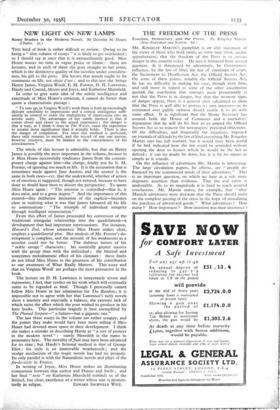NEW LIGHT ON NEW LAMPS
Tins kind of book is rather difficult to review. Owing to its being a "slim volume of essays" it is likely to get overlooked ; so I should say at once that it is extraordinarily good. Miss Hoare wastes no time in vague praise or blame : these are lectures, and in each of them she goes straight to her point, which is the distinctive quality of the novelist under considera-
tion, his gift to the genre. She knows that novels ought to be comments on life, not objets d'art ; and to this test she brings Henry James, Virginia Woolf, E. M. Forster, D. H. Lawrence,
Hardy and Conrad, Moore and Joyce, and Katherine Mansfield. In order to give some idea of the subtle intelligence and exactitude of Miss Hoare's criticism, I cannot do better than quote a characteristic passage :
"To sum up, in Virginia Woolf's work there is both an exceedingly delicate sensibility to impressions and a critical intelligence suffi- ciently in control to order the multiplicity of impressions into an artistic unity. The advantages of her subtle method is that it comes closer and closer to the actual experience ; the danger is that it may, as I think it does in The Waves, cause the experience to assume more significance than it actually holds. There is also the danger of completion. For once this method is perfected, there only remains to record, and the record of any one person, however sensitive, must be limited to the consciousness of his consciousness."
The whole of this lecture is admirable, but that on Henry James is possibly the most important in the volume, because in it Miss Hoare successfully vindicates James from the contem- porary charge against him—the charge, finally put by E. M. Forster, of ignoring too much in life. It is the accusation that is sometimes made against Jane Austen, and the answer is the same in both cases—viz, that the underworld, whether of action or of emotion, is suggested, though not entered, because to have done so NGould have been to distort the perspective. To quote
Miss Hoare again : "The emotion is controlled—that is, it does exist, and to a great degree." And the importance of this control—this deliberate limitation of the explicit—becomes
clear in realising what it was that James laboured all his life to communicate : "The triumph of individual integrity through intelligent renunciation."
From this effort of James proceeded his conversion of the
traditional triangular relationship into the quadrilateral—a development that had important repercussions. For instance, Howard's End, whose eminence Miss Hoare makes clear,
employs a quadrilateral plot. Her analysis of Mr. Forster's de- velopment is complete, and the account of his weaknesses as a novelist could not be better. The dubious nature of his "noble savage" characters ; his scenically greater success with the group than with the individual ; the blurred and sometimes melodramatic effect of his climaxes : these faults do not blind Miss Hoare to the greatness of his contribution to our awareness of What Really Matters. This essay and that on Virginia Woolf are perhaps the most persuasive in the book.
The lecture on D. H. Lawrence is temperately severe and represents, I feel, that verdict on his work which will eventually come to be regarded as final. Though I personally cannot
follow Miss Hoare in her admiration for The Rainbow, it is impossible not to agree with her that Lawrence's early novels
show a mastery and especially a balance, the extreme lack of which ruins the effect which the poet wished to produce in his later books. This particular tragedy is best exemplified by
The Plumed Serpent—" a failure—but a gigantic one."
The last three essays in the volume are rather scrappy, and the points they make would have been more telling if Miss Hoare had devoted more space to their development. I think she makes a mistake in describing Hardy as a sort of pioneer in the modern novel " : surely Meredith is the name to
pronounce here. The morality of Jude may have been advanced for its time ; but Hardy's fictional method is that of George
Eliot ; his style is an immovable weathercock ; and the stodgy mechanism of the tragic novels has had no progeny.
Its only parallel is with the Naturalistic novels and plays of the
fin-de-sikle in France.
In writing of Joyce, Miss Hoare makes an illuminating comparison between that author and Donne and Swift ; and her final " note " on Katherine Mansfield reminds us of the
limited, but clear, excellence of a writer whose star is momen-


































 Previous page
Previous page